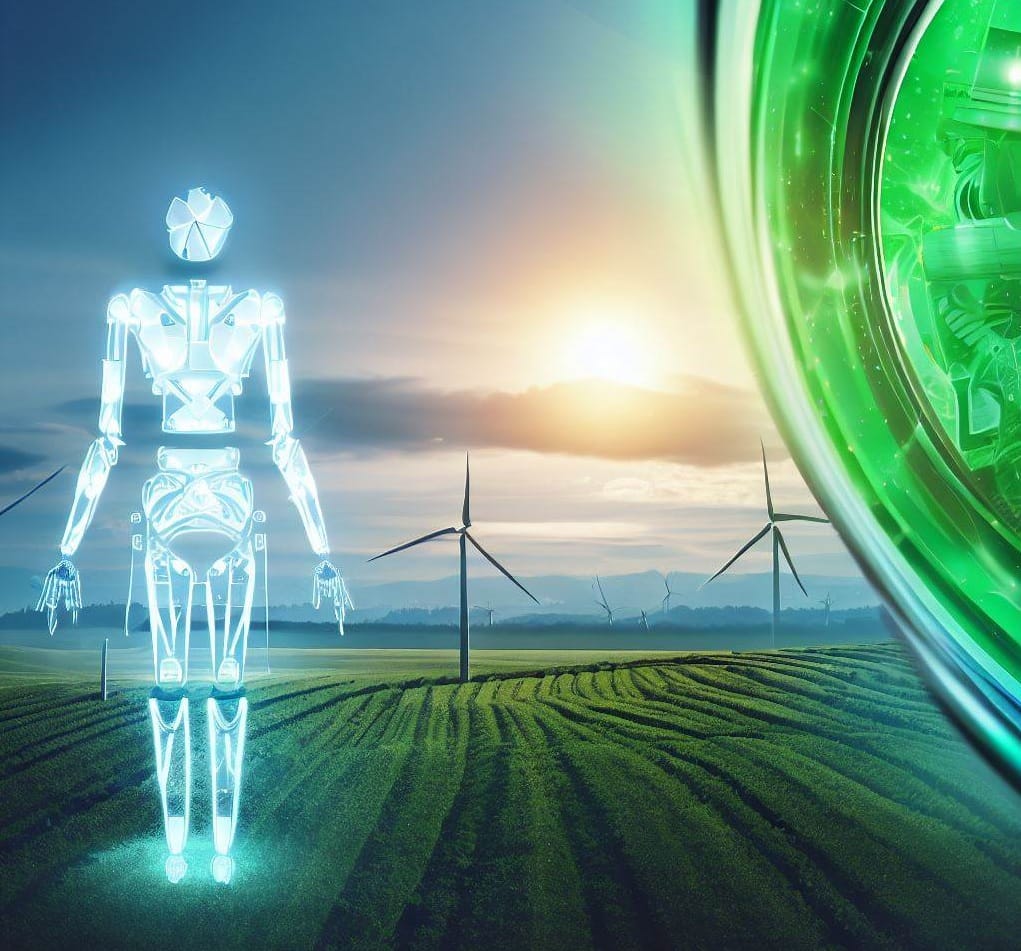In the ongoing battle against climate change, the world is at a crucial turning point where it is imperative to switch to low-carbon and sustainable energy sources. In this endeavor, the fusion of green energy and artificial intelligence (AI) is proving to be a potent force, generating creative solutions and accelerating the shift to a more sustainable future. We can improve energy systems, boost the production of renewable energy sources, and promote higher energy efficiency by using AI's capabilities. In this article, we'll examine how AI may accelerate the use of green energy and have an influence on the development of a low-carbon future.
Enhancing Renewable Energy Generation
A sustainable energy mix must encompass renewable energy sources like solar and wind. The effectiveness and dependability of renewable energy systems may be greatly improved by AI-powered solutions. For example, machine learning algorithms may examine enormous quantities of data to site solar or wind turbines optimally, maximizing their capacity to produce energy. Furthermore, AI systems can increase the forecasting precision for solar and wind energy, facilitating greater integration into the current energy infrastructure. There are several companies that work on enhancing renewable energy generation with AI technology. One notable example is Google's DeepMind. DeepMind has been involved in using AI algorithms to optimize the energy efficiency of Google's data centers, which includes incorporating renewable energy sources into their operations.
Smart Grids and Energy Management
The use of AI in energy management systems has the potential to significantly improve traditional power grids and make them smart grids. These smart systems use real-time data to optimize energy distribution, balance supply, and demand, and increase grid stability. Energy distribution routes may be optimized, peak demand forecasted using AI algorithms, and consumption patterns analyzed to lower transmission losses and boost total energy efficiency. AI-enabled smart grids can also make it easier to integrate decentralized renewable energy sources and provide smooth communication between different grid components. Siemens, a multinational conglomerate, stands at the forefront of providing diverse solutions for smart grids and energy management, encompassing advanced analytics and AI technologies.
Energy Efficiency and Demand Response
Energy efficiency practices are being revolutionized across sectors and homes by AI-driven solutions. AI systems can pinpoint problem areas and suggest energy-saving tactics by examining energy use trends. AI-driven building management systems, for instance, may optimize heating, ventilation, and air conditioning (HVAC) operations based on occupancy and environmental factors, leading to considerable energy savings. Additionally, users may modify their energy use in reaction to grid circumstances thanks to demand response programs powered by AI, which lessens the requirement for fossil fuel-based backup power plants during peak hours. AutoGrid is a company that utilizes AI and machine learning to optimize energy consumption and demand response programs. They provide software solutions that enable utilities and grid operators to manage and optimize energy resources efficiently.
Intelligent Energy Storage
Irregular generation caused by weather conditions is one of the problems with renewable energy sources. However, advances in intelligent energy storage technologies are made possible by AI. AI algorithms can optimize the charging and discharging of energy storage systems by analyzing data on energy generation and consumption, providing a constant flow of clean energy. This technology not only makes renewable energy integration more stable but also makes it possible to utilize surplus renewable energy effectively off-peak.
Accelerating Research and Development
Green energy technology research and development are advancing with the help of AI. AI algorithms can analyze enormous volumes of scientific data through machine learning and produce insights that support the development of novel materials, more effective solar cell designs, and advanced battery technologies. Researchers can also improve the performance of energy systems, lowering costs and raising overall efficiency, with the use of AI-powered simulations and modelling.
Conclusion
The combination of artificial intelligence and green energy presents unprecedented opportunities to address the challenges of climate change and create a sustainable future. From enhancing renewable energy generation to optimizing energy systems, AI is driving the transition to a low-carbon future. As we continue to harness the power of AI in the energy sector, it is crucial to ensure responsible and ethical use, addressing concerns related to privacy, security, and bias. By embracing AI's potential and working collectively, we can accelerate the adoption of green energy, reduce carbon emissions, and pave the way for a cleaner, more sustainable planet.
References:
- Kumar, A., Alaraj, M., Rizwan, M., & Nangia, U. (2021). Novel AI based energy management system for smart grid with RES integration. IEEE Access, 9, 162530-162542.
- Mhlanga, D. (2023). Artificial intelligence and machine learning for energy consumption and production in emerging markets: a review. Energies, 16(2), 745.
- S. Aslam, H. Herodotou, N. Ayub and S. M. Mohsin, "Deep Learning Based Techniques to Enhance the Performance of Microgrids: A Review," 2019 International Conference on Frontiers of Information Technology (FIT), Islamabad, Pakistan, 2019, pp. 116-1165, doi: 10.1109/FIT47737.2019.00031.
- Saheb, T., Dehghani, M., & Saheb, T. (2022). Artificial intelligence for sustainable energy: A contextual topic modeling and content analysis. Sustainable Computing: Informatics and Systems, 35, 100699.





Comments